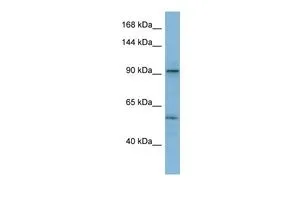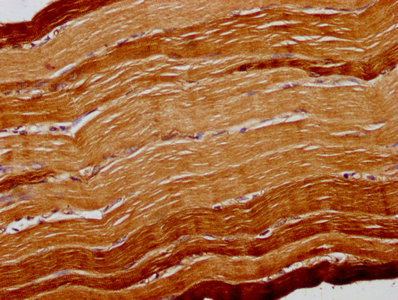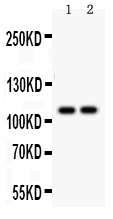
WB analysis of THP-1 cells using GTX47068 ATP2A1 antibody at 0.2-1μg/ml.
SERCA1 ATPase antibody, N-term
GTX47068
ApplicationsWestern Blot, ImmunoHistoChemistry, ImmunoHistoChemistry Paraffin
Product group Antibodies
ReactivityHuman, Monkey
TargetATP2A1
Overview
- SupplierGeneTex
- Product NameSERCA1 ATPase antibody, N-term
- Delivery Days Customer9
- Application Supplier NoteWB: 0.2-2.5 ug/ml. IHC-P: 2-10 ug/ml. *Optimal dilutions/concentrations should be determined by the researcher.Not tested in other applications.
- ApplicationsWestern Blot, ImmunoHistoChemistry, ImmunoHistoChemistry Paraffin
- CertificationResearch Use Only
- ClonalityPolyclonal
- Concentration0.5-1 mg/ml
- ConjugateUnconjugated
- Gene ID487
- Target nameATP2A1
- Target descriptionATPase sarcoplasmic/endoplasmic reticulum Ca2+ transporting 1
- Target synonymsATP2A, SERCA1, sarcoplasmic/endoplasmic reticulum calcium ATPase 1, ATPase, Ca++ transporting, cardiac muscle, fast twitch 1, SR Ca(2+)-ATPase 1, calcium pump 1, endoplasmic reticulum class 1/2 Ca(2+) ATPase
- HostRabbit
- IsotypeIgG
- Protein IDO14983
- Protein NameSarcoplasmic/endoplasmic reticulum calcium ATPase 1
- Scientific DescriptionThis gene encodes one of the SERCA Ca(2+)-ATPases, which are intracellular pumps located in the sarcoplasmic or endoplasmic reticula of muscle cells. This enzyme catalyzes the hydrolysis of ATP coupled with the translocation of calcium from the cytosol to the sarcoplasmic reticulum lumen, and is involved in muscular excitation and contraction. Mutations in this gene cause some autosomal recessive forms of Brody disease, characterized by increasing impairment of muscular relaxation during exercise. Alternative splicing results in three transcript variants encoding different isoforms. [provided by RefSeq, Oct 2013]
- ReactivityHuman, Monkey
- Storage Instruction-20°C or -80°C,2°C to 8°C
- UNSPSC41116161







